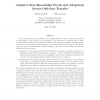1446 search results - page 10 / 290 » Local zero knowledge |
107
click to vote
EUROCRYPT
1999
Springer
15 years 6 months ago
1999
Springer
Abstract. We present the first efficient statistical zero-knowledge protocols to prove statements such as: – A committed number is a prime. – A committed (or revealed) number ...
120
Voted
TCC
2009
Springer
16 years 2 months ago
2009
Springer
In the setting of secure computation, a set of parties wish to securely compute some function of their inputs, in the presence of an adversary. The adversary in question may be st...
117
Voted
TCC
2010
Springer
15 years 9 months ago
2010
Springer
Introduced by Micali, Rabin and Kilian (MRK), the basic primitive of zero-knowledge sets (ZKS) allows a prover to commit to a secret set S so as to be able to prove statements such...
116
click to vote
CRYPTO
2009
Springer
15 years 8 months ago
2009
Springer
Abstract. We show that only languages in BPP have public-coin, blackbox zero-knowledge protocols that are secure under an unbounded (polynomial) number of parallel repetitions. Thi...
107
Voted
CRYPTO
2009
Springer
15 years 8 months ago
2009
Springer
We suggest practical sub-linear size zero-knowledge arguments for statements involving linear algebra. Given commitments to matrices over a finite field, we give a sub-linear siz...

